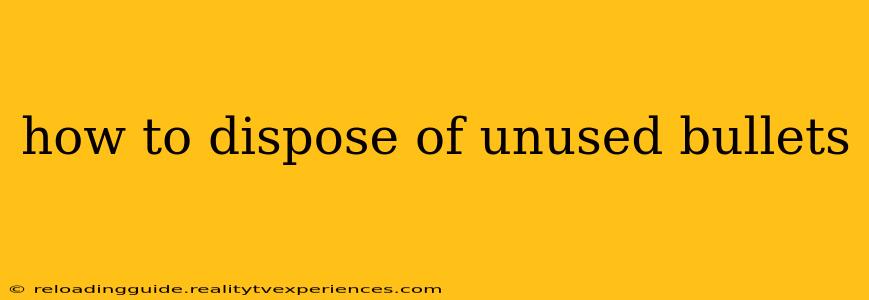Improper disposal of ammunition, even seemingly innocuous items like unused bullets, can pose significant risks to public safety and the environment. This guide provides a comprehensive overview of safe and legal methods for disposing of unused bullets, covering various types of ammunition and addressing specific regional regulations.
Understanding the Risks of Improper Disposal
Before delving into disposal methods, it's crucial to understand the potential dangers of discarding bullets improperly:
- Accidental Discharge: Improperly stored or discarded bullets can lead to accidental discharge, causing injury or death. Even seemingly inert rounds can be dangerous if mishandled.
- Environmental Contamination: Lead, a common component in bullets, is a toxic heavy metal that can contaminate soil and water sources, harming wildlife and potentially impacting human health.
- Illegal Activities: Improper disposal can inadvertently contribute to illegal activities, such as the acquisition of ammunition for criminal purposes.
Safe and Legal Disposal Methods
The best method for disposing of unused bullets depends on your location and the type of ammunition. Always prioritize safety and legality.
1. Local Law Enforcement: Your Primary Resource
Your local law enforcement agency is often the best resource for ammunition disposal. Many police departments and sheriff's offices have designated drop-off locations or will arrange for pickup of unused ammunition. Contact your local agency to inquire about their procedures and any specific requirements. This is generally the safest and most reliable method.
2. Licensed Dealers and Gunsmiths: A Convenient Option
Some licensed firearms dealers and gunsmiths may accept unused ammunition for disposal. Contact local businesses to determine if they offer this service. This method offers convenience but may incur a small fee.
3. Municipal Waste Facilities: Proceed with Caution
Some municipal waste facilities may accept ammunition, often as part of hazardous waste collection programs. However, this is not universally available and requires careful investigation. Contact your local waste management authority to confirm their policies and procedures. This method might require special handling or labeling. Always follow their specific instructions meticulously.
4. Ammunition Recycling Programs: Emerging Solutions
While less prevalent than other options, some organizations and initiatives are exploring ammunition recycling programs. These programs often focus on recovering valuable metals from spent ammunition, but some may also accept unused cartridges. Research local or national initiatives for potential avenues.
Specific Considerations:
- Type of Ammunition: The disposal method may vary depending on the type of ammunition (e.g., handgun, rifle, shotgun). Contact your local authorities for specific guidance.
- Quantity: Large quantities of ammunition may require a different approach than disposing of a few rounds. Always contact your local authorities to discuss appropriate procedures.
- State and Local Regulations: Laws and regulations concerning ammunition disposal vary significantly from state to state and even between municipalities. Always check your local laws before attempting any disposal method.
Preventing Future Accumulation:
Responsible gun ownership includes proper storage and inventory management. Regularly check your ammunition inventory and consider donating any excess rounds to qualified individuals or organizations, if permitted by law.
Conclusion: Prioritize Safety and Legality
Disposing of unused bullets requires a responsible and informed approach. Prioritize safety and adhere to all applicable laws and regulations. Contacting your local law enforcement agency is always the recommended first step. By following these guidelines, you can ensure the safe and environmentally responsible disposal of unused ammunition.

